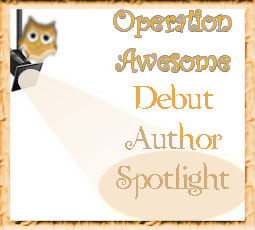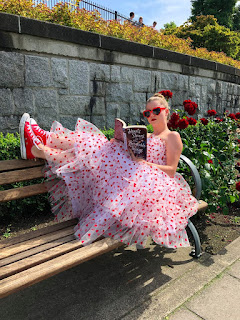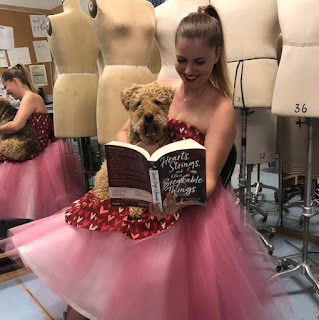The 2019 special question asked of debut authors:
Why do you think readers should write book reviews?
It's a chance to share your opinion with other like-minded readers, to help navigate the world of stories. There's nothing better than finding your next favorite adventure. If the reader is also an aspiring writer, then that's even more important! It grows the skill set to understand what works and doesn't work about another writer's story, and it also helps the author by spreading the word!
- Laura Gia
West
I think readers should write book reviews because these review really mean a lot to the people whose writings are being read. Irrespective of the reviews whether they are good or bad, they open a scope of getting better for the best.
- Abhishek
Behera
I think writing a review is an excellent way to show support to writers whose work you enjoy. Such a simple thing can make such a difference to writers, especially newer writers who are hoping people will take a chance on their work.
- Deborah A
Stansil
because we are writing for them.
- Nidhi
GS
It helps the writer improve, it helps the writer understand his/her good and bad points, additionally, it helps other readers to know about the book.
- Balaka
Basu
It helps readers to become more aware of what they do and don't like in a story, as well as helping authors to potentially pinpoint issues in their own writing that they might want to improve on in the future.
- Rebekah
Loper
How else are we going to find out which books will grab us by the hearts and eyeballs?
- Scott
Wilson
Ideally, so they’ll have to really think about the books that they’re reading in some depth. At least, that’s why I write them.
-Gail
Shepherd
I love book reviews, and I wrote some myself. I think book reviews are extremely important because that’s one way for authors to hear from readers, and see what resonated with them and what didn’t work. I read every single review about my book (on Goodreads, Instagram, blogs, etc) and I want to continue to do so. I want to see if I succeeded in stirring emotions in the readers. I want to know what annoyed them and what they truly hated. I want to be a better storyteller.
- Natasha
Tynes
I didn’t understand the importance of reviews until I wrote a book. Yes, reviews help sell. Yes, reviews boost ratings and turn other people on to a novel. But as an author, I just want to know what people thought of my book! If they had a favorite character or if they especially hated the car in scene three. It boggles my mind that we can reach out to authors and let them know what we thought of the musings from their head. The world is a magnificent place.
- Chelsea Marie
Ballard
Reviews are a great way to help your favourite authors gain more visibility, and also to introduce others to wonderful books they may not have heard of. I always read reviews on Goodreads before I buy a book to get an idea of whether I will like it or not. I’m not sure I’m brave enough to read reviews of my own work, though!
- Anstice
Brown
Writing book reviews helps distil how you feel about a book. Why you like it or why you don’t. I find writing book reviews helps my own writing because when I don’t like something, I’m forced to ask myself why and to figure out a way to articulate what I feel is wrong. That thing is then on my radar, so when reading my own stuff critically, I might notice something I wouldn’t have earlier.
-Kate
Larkindale
Reviews are so important! One, because what reader doesn't like to talk about books? And reviews are a great space for readers to share what they loved (or didn't) about a book. Also, reviews are SO helpful for authors. Sites like Amazon use review-based algorithms that impact where that book "sits" on their digital shelves, so the more reviews the better.
-Lillian
Clark
The process of writing a review presents an opportunity for readers to reflect. What did the story mean to me? It expands the community of readers and provides for an exchange of ideas. Reviews keep writers honest. Good reviews encourage; meaningful critiques help the writer get better. And reviews sell books.
-Bo
Kearns
Reviews help tremendously to exposure and to someone's decision to support/buy that author's work. Just like Yelp and restaurant reviews might help you decide where to go out Saturday night, the reviews on Amazon or Barnes&http://Noble.com or other sites you can leave reviews will help other readers to get a feel for the book and decide if that's what they're looking for. Please leave me a review!!
-Danielle
Ledezma
Reviews help spread the word about books, as do “shout outs” and shares on social media. There are so many books published every year, and each book is vying for attention. If you like a book, write a review or share some social media love to help spread the word.
- Sarah
Scheerger
Three reasons.
1. It helps other readers with similar tastes know what they will and won’t like.
2. It helps sell books as it contributes towards promotional hype.
3. The nice reviews give us writers something to shout about - so if you’re a blogger you get an author-endorsed push too.
-N J
Simmonds
Oh my gosh, book reviews are so incredibly important! They can help a reader decide whether they want to give a book a chance. Especially as a self-published author, word of mouth is one of the strongest tools we have. That being said, reviews need to be written in a useful way. If I read a review and it just says the book was amazing or the book was awful, that’s not useful. WHY was it good or awful? I want to know what specifically about it was good or bad. IT also potentially lets the author know what they can use to apply to future projects. Well-written reviews (whether positive or negative) are incredibly useful feedback.
-J.
Lawson
There are two reasons. First of all, it helps authors! If you liked a book and think an author should keep writing, write a review. It doesn’t have to be a five-star review (even a one-star review can help!).
Readers should also review books so that other readers know what to expect. I used to read Goodreads reviews every single time I thought about picking up a book. Both the high praise reviews and the negative reviews told me something about the book and helped me decide whether the book was for me.
-Claire
Bartlett
Book reviews help readers decide to buy a book and they help writers sell books. But don’t be mean. Every book is an author’s heart and soul. Keep that in mind.
-Sam
Hawk
Because every time you read a book and don’t review it, an author looses a sliver of their soul :)
In all seriousness though, reviewing books is important for so many reasons. If you love a book, the best way you can thank an author is to review it. It drives visibility and sales which trickles down to then allowing the author another shot at their next book. If you hate a book and find it incredibly problematic, it’s well within your right to say so and maybe would help like minded people avoid reading something they wouldn’t enjoy.
That seems obvious though. Less obvious would be that it doesn’t matter what ‘level’ of your writing career you are on. Starting out, debut, 20 books under your belt, it’s the same for all: almost every single writer I know will go through phases where we question why we do this, etc. Negative thoughts can try to sneak in and tell you that everything you’ve ever written belongs in the trash. When you are feeling THAT down, look at your phone and have a review from someone who says your book changed their life—in a millisecond— your attitude is adjusted and your hope somehow renewed.
-L.D.
Crichton
I think it helps other readers know if a book is a good fit for them. I also think the review process for each reader is very personal. Once this book is in your hands, it is ultimately your story too. It will inspire entirely different emotions in you than it did in me, or your friends, or your mom... No two people will have the same feelings about a book. Just like how I am one of two people who love the movie Waterworld.
Also, this is my first time being an author at the end of a book review from a stranger. I’ve been told by a few authors that I shouldn’t read the reviews, but I did in the first few weeks. Initially, there was this visceral gut-punch realization that it is out there in the world and real people are reading it and I can’t pull it back if there are things about it they don’t like. Its over, done, and free for everyone to form opinions about. Imagine spending years of your life working on this one creative project, building characters, molding their story and lives–basically living in that place with them–and then turning it over to the world without the ability to alter or change it anymore. It is utterly terrifying. I’ve learned a lot based off the reviews so far. Nothing will ever be perfect, but the few reviews I have read tell me what I’m doing really well and what I will work on in the next book.
-Kaytalin
Platt
I think leaving reviews is the best way to do other readers a favor. Our internet culture too often seems to feeds off negativity. Writing a review for a book you enjoyed is like the literary equivalent of planting a tree. You are doing something good not just for the author but for the world—for other readers who might now also discover the book and love it as much you do.
-Stephanie
Jimenez
This book publishing industry is falling. But I’ve heard more and more people would like to write than read. As such, someone should explain the joy of book reading. That’s the stimulus package for the industry. It’s the review, not the book, that would drive their appetite for the good books.
-Keita
Nagano
Book reviews are the BEST way to help an author whose work you loved. Even a few short words of appreciation can be enough to bring a whole host of new readers to the story, and that's a pretty sure-fire way to guarantee you're going to get MORE stories from this author. Essentially, you're boosting awareness, whether it's with a full or short review, or even a 5 star rating on its own. You're becoming part of the story's story, and that's pretty badass if you ask me!
-Luke
Dalton
Book reviews are incredibly helpful to authors. Most of us are on our own for marketing and honestly the best support we get is reviews from readers. If you appreciate an author’s work, leaving a review is a great way to support them. And, of course, it helps other readers figure out if the book is a fit as well. Gotta love a win win!
-Malayna
Evans
If a reader enjoyed a book then reviewing it is really one of the best ways to thank the writer. It helps other readers to find the book and helps it to stand out in the marketplace.
-Jennifer
Camiccia
Reviews are so crucial ; think of the last time you took a chance on an unknown author with 2 book reviews. Then think of the last time you impulse-bought a book because it had dozens (or hundreds) of reviews with a decent rating. Plus, in the end, getting more people to read the books you love just means more people to made headcanons and geek out with.
-Avery
Ames
My favorite books have come from friends telling me about a book they think I would love, whether that’s over a cup of coffee or in a conversation on social media. It’s such a joy to be able to connect someone with a book they love and reviews help do that!
-Elizabeth Chiles
Shelburne
To spread the good word! It may inspire someone else to pick up the book.
-Jordan
Zucker
Because reviews are the only way to keep books alive—in today’s world where readers have more power and platform than ever before, they should exercise it to show the books they love to other readers.
-Damyanti
Biswas
I think readers should write book reviews if they want to connect a little bit more with the story. Sometimes, I don’t know exactly how I feel about what I’ve read until I write it out. So, writing a review can be helpful for the reader to process what they’ve just read, but it’s also supremely helpful for other readers to get a sense of what they can expect when they get into a novel.
Personally, I don’t rely exclusively on book reviews to tell me if a story is good or not. Sometimes, I love a book that other people didn’t, or I just didn’t connect with a book that has starred reviews across the board.
-Kelly
Coon
Book reviews are a great way to share your joy in a book (or air your concerns). They help readers find good books and help authors and others in the book industry understand more about their readers.
-K H
Canobi
Readers should write reviews for other readers. It can help others find great books. Reviews should be honest but not mean—that’s true in life not just reviews!
-Lisa Moore
Ramée
I think reviews, especially positive ones, help authors more than anyone realizes, in so many ways! Word of mouth is essential. Not everyone has the marketing budget of the big publishing houses. So if you love something, don’t keep it to yourself! We writers appreciate it more than you know!
-Liz
Kerin
People should write reviews to create a culture of response to a work, providing links between readers who are looking for their next story dive. It takes a lot of kind, articulate responses to combat the generic, mean ones, but together we can create a community of readers who are truly invested in sharing their ideas about stories with each other. Whether a response is positive or negative, being able to frame it in a way that helps direct other readers is a gift to the reading community. Be honest. But be kind. Authors are human too.
-Jacqueline
Firkins
I am a huge fan of readers (all readers—regardless of age) writing reviews. It’s probably the only way for authors to accurately gauge whether or not our work is connecting. That’s why I frequently have my middle school student write and share their reviews with peers.
-Ernesto
Cisneros
What question would you like debut authors to answer in 2020?
Which debut author spotlight was your favorite this year?
Congratulations to Kim C who won the
Rafflecopter giveaway.




















